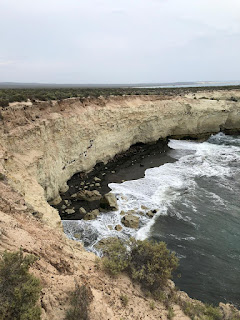The essence of scientific research
“I don’t know, I’m making this up as I go.” — Indiana Jones and the Raiders of the Lost Ark (1981) (yet another of my Indy Jones’s quotes)
In recent times (and in some countries more than in others), there is an increasing debate about what scientists do. The various challenges humankind faces, from global change, to sustainable food production or antimicrobial resistance, heed urgent solutions for which, a vast part of modern society agrees on, should be based on science.
The urgency for scientist to get down to work and solve our ‘big’ issues, resonates with (some) research agencies and employers. It is not new to many of us, that via oriented research grant windows, we are drawn towards studying new issues or systems which match our interests with those of the funders. Needless to say, here, research needs funding (I say this because it seems to me that not all employers in the Global South are fully aware of this connection). However nowadays, we see a stronger pressure to pursue ‘useful’ research. As many of us are public employees, or work in more applied research centers, there is an increasing (conservative and nationalistic) conception that places the need of tangible deliverables following taxpayers’ investment.
But scientist do accountable work. We carry out experiments and write-up our findings in the form of reports and, importantly, of peer-reviewed papers. We produce from new information, to confirmation of findings to groundbreaking discoveries in a very transparent way. Our work is shared by the scientific community and is increasingly widely available (although some tiny issues arise here) as is the data we collect.
However, competition among scientists and some sort of ‘paper production industry’ we have constructed may have contributed to a somewhat negative image. The vision is that we produce papers in large numbers (often through salami science) only to further our careers and secure better jobs. Moreover, employers are often led to request from scientists, more involvement in activities where we are seen solving people’s problems. Calls to engage in outreach activities such as stands in fairs and exhibitions, engaging with the press and giving talks or planning events for schools, are valued as they give visibility or our work.
If no one would disagree generally with this view, there are a few, slight problems. While for some of us, participating in extension activities may not be big deal, for others it would imply acquiring new skills and clever time management planning. Aside from the negative connotation of competition as mentioned above, PhD students, postdocs and ECRs are in need to publish their work or complete their dissertations to be able to sustain a career in science. Asking them to diverge, even if for a perceivably low time assignment, may add to their stress or may even force them to play a role they do not feel comfortable with.
Employers often attempt to circumvent this by assigning value to activities other that writing papers, so that this does not become a handicap in anyone’s career, especially during the early stages. However, we still need time to ensure we can quantify these well, an aspect-if criticized by many- we have more a less established for academia (teaching activities, papers, citations, etc.). Also, our frame of mind needs adapting. For instance, are job search committees ready to rank candidates differently? Are students trained in a way in which publications in high ranked journals are not the “Holy Grail”? The thing is that for transparency in grant and employment assignment, we need clear, translucent criteria.
Another issue, has to do with the way we do science today. For instance, modern ecologists, are faced with need to learn new modelling and data analysis skills. Population geneticist, need to work out how new apparel is used or new techniques are put in practice. We are also urged to learn to work in secure and healthy laboratory and field conditions, from first aid training, to working climate practices. I would add the need to learn how to deal with increasing beaurocracy, but will leave this for another post. In sum, quality scientific research implies deep knowledge and specialization which require full-time dedication. Many, many hours in the field or in the lab, and uncountable additional time, devoted to reading and studying are not simply relevant. They are absolutely needed.
Assuming we can make huge numbers of safe vaccines-as we saw during the COVID 19 pandemic- without the base-line knowledge acquired by so many (from so many countries) of white-coated scientists, is not only absurd, but definitively a display of a limited knowledge on how science works. Many of those scientists spent their lives enquiring (and publishing their findings) in exploring the DNA molecule in detail among many other things. Mostly moved by curiosity and not by any specific request. I wonder what ‘deliverables’ did John Watson, Francis Crick, Rosalind Franklin, or Charles Darwin leave us, aside from a few highly cited papers or books. Think of Karl von Linee, wandering through fields in Sweden, giving names to plants and animals, instead of doing some ‘real work’.
There is also another aspect often taken for granted. Scientists, in a rapidly changing world, should not necessarily respond to current demands, but should reserve the right of looking ahead. Who could foresee the need for a vaccine for a disease unknown to humankind until 2019? Finally, it is also important to remind us of the amazing human asset of creativity. Investigating certain research questions often leads to unexpected discoveries, that likely, only a trained, open mind will see.
Let us not be confused by a few problems noted for academia. This likely relates to more science worldwide which we need, not only with more scientists and more investment, but also and importantly, through a more diverse and inclusive science. We need to preserve the essentials of scientific research or else, we may be shooting at our own feet.




Comments
Post a Comment